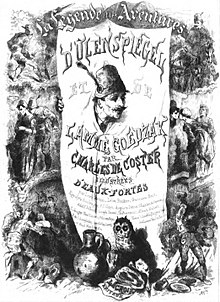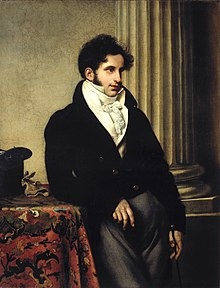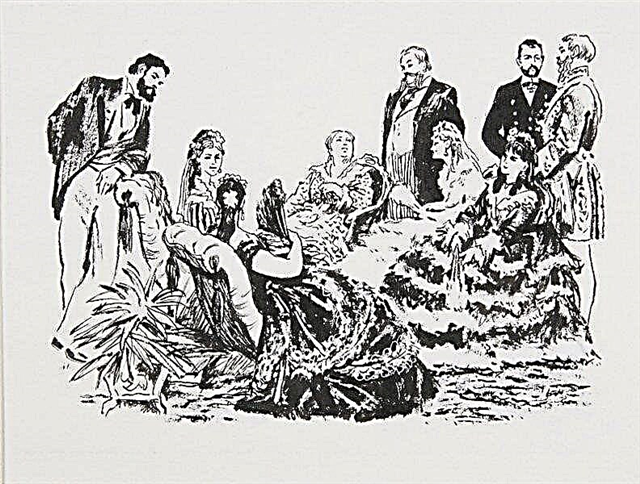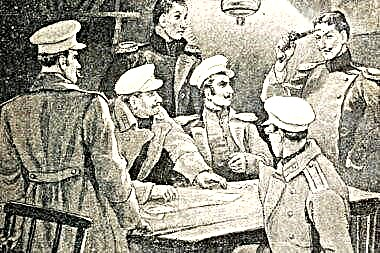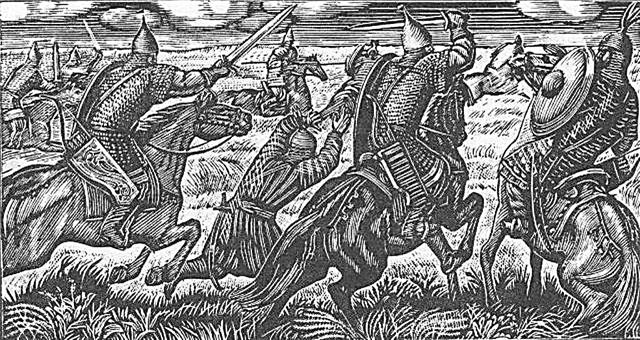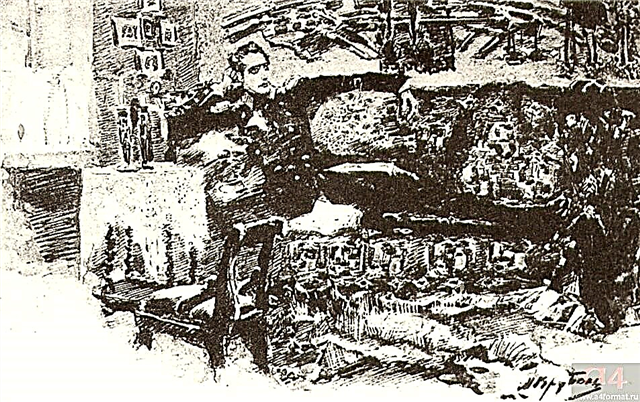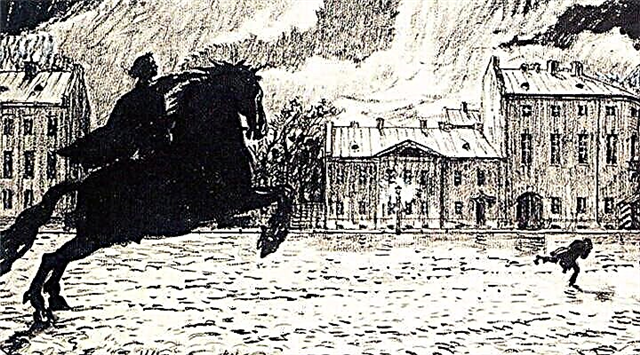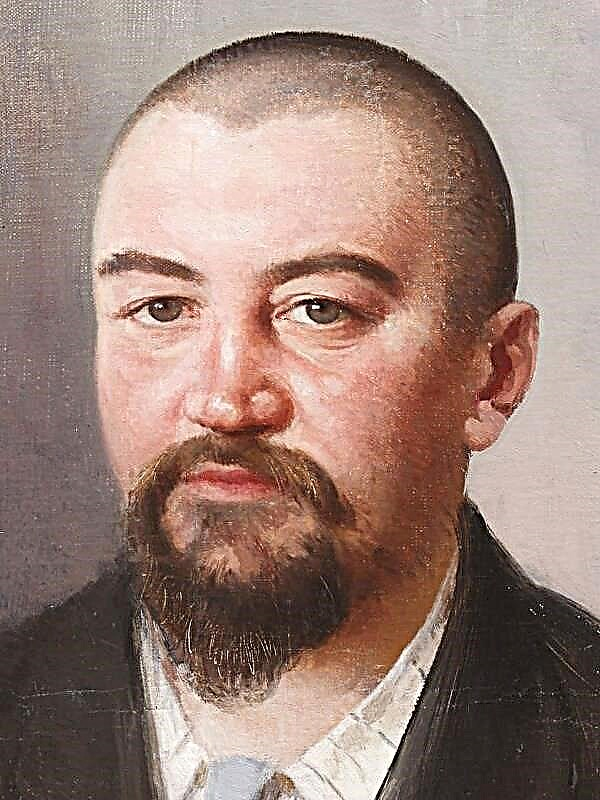The novel in three books, saturated with excerpts from genuine ancient Egyptian texts, adjacent to the emphasized modernized realities of the social life of the distant past, begins with an introduction in which the author sets out his views on the history of the ancient Egyptian state: “Egypt flourished while the monolithic people, energetic kings and wise priests worked together for the common good. <...> And when <...> the Asian luxury that penetrated the country absorbed the energy of the pharaohs and the wisdom of the priests, and these two forces began a struggle among themselves for the monopoly robbery of the people, <...> the light of civilization shining over the Nile for thousands of years ".
XI century BC e. In the thirty-third year of his successful reign, Pharaoh Ramses XII proclaims his twenty-two-year-old son Ramses as heir to the throne. Having received the coveted title, the prince - a handsome young man with an almost feminine face - asks to appoint him the leader of the Menfi corps. Father agrees to do this if Ramses shows himself well in maneuvers, during which he will command part of the army. The Minister of War Herichor, the high priest of the temple of Amon, a man of more than forty years of powerful build, closed and silent, will watch him. During maneuvers, everyone is amazed at the knowledge, energy and foresight, endurance and unpretentiousness of the heir, who, despising luxury, rides astride in the clothes of a simple officer.
The road along which the army moves is crossed by two sacred scarab beetles. Herihor demands that the shelves go around them, making a big detour through the desert. Ramses is forced to agree, although he does not hide his anger: everyone in Egypt is commanded by priests! Because of them, the country is becoming scarcer, the army is falling apart, the conquered peoples are insolent. But, ascending the throne, Ramses will turn the priests into their faithful servants and take possession of their treasury, which is much richer than the treasury of the pharaoh. “Only the lords who obeyed the gods and priests remained in human memory; the rest are forgotten, ”remarks the scribe of Herihora, Priest Pentuer, a thin ascetic who comes from the people, but thanks to his exceptional abilities, occupies an important public office. All the while, the Pentuer mourns over the plight of ordinary people and wants to help him.
During the maneuvers, Ramses meets the young Jewess Sarah and, shocked by her beauty, buys the girl from her father Gideon.
Returning to Memphis, Herihor does not advise the sixty-year-old pharaoh to give the young man the corps of Menfi: the heir is still too young and hot, although he admired the famous commander Nitagoras with his courage.
Not having received the corps, Ramses is furious. He knows: this is the work of Herichor! The priests once taught the prince himself, and he knows their insatiable pride and thirst for power!
Ramses' mother, the stately forty-year-old beauty Tsarina Nicotris, is angry: how dare the heir to make a Jewess his first concubine ?! And is he really the enemy of the priests? How is he going to rule Egypt without them? For many years, the pharaoh with their help avoided wars ... Ramses believes that a successful war would quickly enrich the treasury. In the meantime, in order to give the promised reward to his soldiers, the prince on monstrous conditions borrowed money from a moneylender - the Phoenician Dagon.
Impulsive and stubborn, but wise and fair, Ramses sees the disasters of the people, the arbitrariness of officials - but so far nothing can change. For the first time, he feels “that there is some kind of power that means infinitely more than his will: the interests of the state, to which even the almighty pharaoh obeys. <...> The state is <...> something more grandiose than the Pyramid of Cheops, more ancient than the Sphinx, more indestructible than granite. " And yet, Ramses decides to subjugate the priests and establish his own order in the state!
Someone is spreading rumors about the goodness of the heir. The people adore him. Pharaoh appoints his son as governor of Lower Egypt and asks to understand why less and less taxes go to the treasury. But the young man is drowning in the mountains of complaints, bills and reports. He is horrified: if people find out how helpless the prince is in the role of ruler, he can only die. He cannot live without power! Priest Mentsesufis explains to Ramses that only the wise priests know the secret of government. And Ramses understands with indignation: in order to join this secret, he will have to bow his head before the priests. He is more and more annoyed by the clogged mob, and he realizes that only the aristocracy is the class with which he shares the same feelings.
To the three highest Egyptian priests - Mephres, Herichorus and Pentuer - is Beroes, the great magician, prophet and sage of Babylon. The Egyptians bow their heads before their elder brother, and he forbids Egypt to fight with Assyria for ten years: the stars say that the Assyrians will defeat the Egyptians. It is better to give the Assyrians under the rule of Egypt Phenicia. The Babylonian priests will arrange that the king of Assyria will soon send an embassy to Egypt ...
Artful Phoenician merchants - Dagon, Rabsun and the gray-bearded prince Hiram, having heard about the fact that their homeland can be given to the Assyrians, are horrified: this is ruin! Through his debtor Ramses, Dagon must disrupt the priests' plans, prevent the conclusion of an agreement between Assyria and Egypt and force them to fight each other. And Ramses needs to slip the Phoenician Kama to the priestess of the goddess Ashtoret. This, of course, is blasphemy, but the priestess who committed it may later die, And Sarah also needs to be removed so as not to interfere ...
Seeking to know the secret of government, barefoot Ramses, in a rag of a pilgrim, comes at night to the temple of the goddess Hator near the city of Bubast. In the temple the prince learns the power of the gods and for many days with zeal and faith indulges in pious trials. Pentuer solemnly tells the young man about the past greatness of Egypt and its current decline. The country's grave was its victorious war! Many farmers perished in the campaigns, and of those who survived, all the squeezed officials squeezed all the juices. So now there is no one to pay taxes! Here comes the desert on fertile land! It is necessary to alleviate the situation of the people - otherwise Egypt will perish. The country needs peace, and the peasants need prosperity.
Arriving in Bubast, Ramses finds out that the treasury is again empty. He takes money from Prince Hiram, who tells him that Phenicia is given to the old enemies of the Egyptians - the Assyrians. The priests are afraid that if the war begins, the pharaoh will defeat Assyria, take its infinite wealth and become strong and powerful. And then the priests can’t cope with him, whispers to the shocked youth Hiram.
At night, he leads Ramses to the Phoenician temple of the goddess Ashtoret, where "cruelty sits on the altar, and debauchery serves her." In the temple, drunk with love songs, Ramses first sees his double, and then - a naked woman with a gold bandage on her hips - the beautiful priestess Kama. If she knows love, then death awaits her. Since this girl is inaccessible, Ramses falls madly in love with her (he has long since cooled for the meek Sarah). But, returning to himself, he learns that Sarah gave birth to a son.
The Assyrian ambassador Sargon arrives in Bubast and begins to harass Kama. Having hated him, Ramses firmly decides to fight with Assyria. In the meantime, he admires his son, terribly proud of his paternity. But the Phoenicians quickly destroy this idyll, again making Ramses jealous of Kama. Ramses' double, Greek Lycon, is passionately in love with her, too, whom the lying and greedy priestess deeply despises.
Excited, Sarah explains to Ramses how clever Phoenicians will profit from the war, selling at exorbitant prices to both Egypt and Assyria, buying up the loot cheaply, and will get rich when both warring countries are ravaged.
The Phoenicians give Ramses Kama. She rolls up hysteria and demands that Ramses expel Sarah from the palace with her Jewish bastard. Shocked Ramses runs to Sarah, and she admits that the baby's real name is Isaac. So the priests commanded, deciding to make him king of Israel. Ramses is furious. His son was stolen! Tsarevich’s hatred of the priests is growing. He makes Sarah a servant of Kama, but then sends a meek Jewess with a child to a house in the garden.
To please the Assyrians, the pharaoh dissolves four hired Libyan regiments at the request of the priests. Libyans rob Egypt. Calling the priests traitors, Ramses, by order of the pharaoh, destroys the Libyan gangs. But Mefres will never forgive the prince insults,
And Kama is horrified: having thrown her a beautiful veil, the adherents of the goddess Ashoret infected the apostate priestess with leprosy. Lycon makes his way to Kama. In order to take revenge on Ramses, who had taken his beloved from him, Lycon, at the instigation of an evil Phoenician, kills his son Sarah and flees with Kama. Everyone believes that Ramses killed the baby. Maddened by grief, Sarah takes all the blame upon herself, and the unfortunate woman is thrown into prison. Mephres is trying to make Sarah admit that the killer is Ramesses: in this case, he will never become a Pharaoh. Meanwhile, the police chief and Hiram grab Kama and Licon. Hoping that the priests would cure her, Kama tells them that Lycon committed the crime. Mephres leaves the evil Greek at home, Kama is taken to the desert to the lepers, and Sarah dies of grief.
In the moment of his triumph, the winner of the Libyan Ramses learns about the death of his son and Sarah. The shocked prince returns to Memphis. On the way, at the foot of the sphinx, a young man learns about the death of his father.
In the palace they welcome Pharaoh Ramses XIII. “I am not a priest, I am a soldier!” - he declares. The people rejoice and know, the priests mourn. The highest dignitaries report to Ramses: the army is small, there are hunger riots in the country, the treasury is empty - almost everything went to donate to the temples. Pentuer advises paying the people for community service and giving each peasant a piece of land. But this is not at all like the nobility. And the people expect the new pharaoh to ease his position, and grumbles at the power of the priests. Ramses is angry: everyone wants a change for the better, but as soon as he starts to do something, his hands are tied up right away!
And yet, having expelled from the palace a crowd of henchmen-courtiers and having removed from Herichor's affairs, Ramses works from morning to evening. The army is growing and strengthening. The exercises are held. All Egypt seems to come to life. But the treasury is empty. Priests give nothing. Dagon, too: the whole of Phenicia is saving up money to pay off the Assyrians. Ramses understands: without money he will perish. But Hiram, secretly coming to Ramesses, promises to lend him a huge amount if Pharaoh allows the Phoenicians to connect the Mediterranean and Red Seas with a canal. The priests, of course, are against it - they are afraid that the channel would not enrich the pharaoh. Hiram soon introduced Ramses to the priest Samont, who knew many priestly secrets. Samont is very intelligent and ambitious, but the priests do not allow him to rise, and he is now ready to overthrow the entire priestly caste. Considering the contract with Assyria shameful, Samont promises to get evidence of the treason of the priests, the pharaoh will then bring Mephres and Herichor to justice and find the way to the innumerable riches stored in the treasury of the priests - the famous Labyrinth. Soon, Samontu will get the plan of this building.
After the burial of his father, Ramses travels around Egypt. The people adore Pharaoh, knowing before him slavishly, the priests prostrate themselves. Only Mephres and Herichor are adamant. At their instigation, the temples demand all debts from the pharaoh, and the people of the priests whisper to the peasants that Ramses allowed not to pay taxes. Herihor speaks with contempt about Ramesses - a spoiled boy who gives orders, without thinking about how to implement them or about the consequences. And Herichor still rules, and he has more power than Pharaoh! The priests have enormous wealth and excellent organization. So either Pharaoh will be with the priests, or they will do without him. After all, they only care about the good of the state!
The people of Ramses incite the people to attack the temples. Pharaoh himself, under the pretext of protecting the Labyrinth from the mob, is going to introduce his soldiers there and capture the treasury. Herihor provokes the crowd, seeking her to storm the temples a few days earlier than the deadline set by the pharaoh, at a time when it is beneficial to Herihor himself. And Mefres wants to become the Keeper of the treasures of the Labyrinth and put on the throne the double of Ramses - Lycon. He also turns out to be clairvoyant: looking into a black ball, he learns that Samont is roaming the Labyrinth. Soon he was tracked by Mephres and the treasure guards. Samonta takes poison, and the fanatical guards decide to remove Mephres and Licon: they seem to have a Labyrinth plan too ...
On the day planned by Herihor, the crowd rushes to smash the temples - and here begins a solar eclipse, about which the priest was warned by the poor sage Menes. The people howls in horror. Herihor in solemn vestments loudly prays to the gods to spare the lost, and the crowd enthusiastically praises their savior. Priests pick up the reins that have fallen from the hands of Ramses. The chief of the guard, Thutmose, a favorite of the pharaoh, is trying to arrest Herihor and Mephres (Hiram finally brought letters proving their betrayal), but Officer Annan, pretending to be a faithful servant of Ramses, kills Thutmose in the back. Mephres puts a knife in Lycon's hand and sends the Greek to the garden of Pharaoh. And the next moment, the labyrinth guards kill Mephres and set off in pursuit of Lycon. But he manages to rush to Ramses, who left the pavilion of his current lover - the wife of Thutmose, a noble beauty Hebron. Ramses turns Lycon's neck, but the Greek in a dying spasm puts a knife into the stomach of Pharaoh. Closing the wound, Ramses convenes a soldier, wants to lead them to the priests - and dies in the arms of the officers.
Power immediately passes to Herichor. He pacifies the riots, facilitates the life of the people, ensures that the judges are fair, and the priests are righteous, patronize strangers, especially Phoenician merchants, and conclude an agreement with Assyria, without giving her, however, Phenicia, and replenishes the treasury with part of the treasures of the Labyrinth. Egypt is booming. People praise Herihor and scold the boy Ramses, having already forgotten that Herihor only realized his plans. Herichor marries Queen Nicotris, and the nobles proclaim him the first pharaoh of the new dynasty.
And the poor sage Menes smiles: after all, the people live on their own and live - despite the change of dynasties, war and cataclysms. This people is the state! And in order for him to be happy, wise men must work ...



